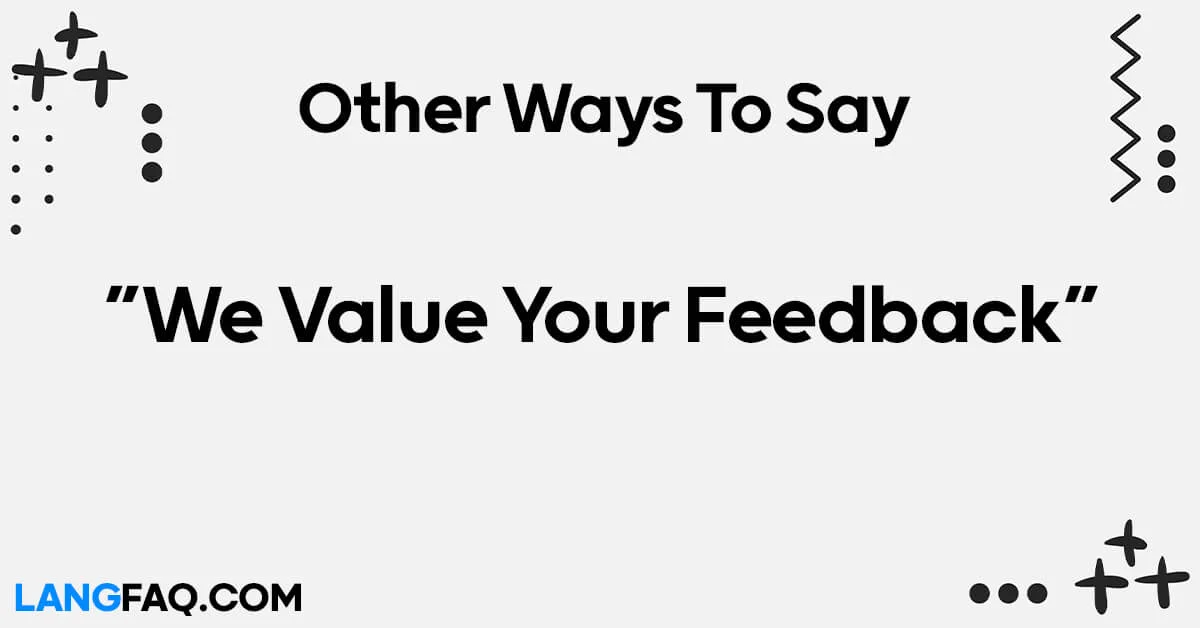Welcome to a journey of enhancing communication and expressing gratitude. In this article, we delve into “12 Other Ways to Say ‘We Value Your Feedback,'” offering unique and engaging alternatives that go beyond the conventional. Effective communication is the cornerstone of any successful relationship, be it personal or professional. By exploring these creative expressions, you’ll not only strengthen your connections but also add a personal touch to your interactions.
12 Other Ways to Say “We Value Your Feedback”
Here are 12 alternative ways to express “We Value Your Feedback”:
- Your insights are highly appreciated.
- We place great importance on your feedback.
- Your thoughts and opinions matter to us.
- Thank you for sharing your valuable perspective.
- We genuinely value the input you provide.
- Your feedback is crucial to our continuous improvement.
- We hold your insights in high regard.
- Your contribution is instrumental to our growth.
- Thank you for taking the time to share your thoughts.
- Your feedback is an essential part of our decision-making process.
- We are grateful for the constructive feedback you’ve offered.
- Your viewpoint is significant in shaping our direction.
Here’s a table with meanings and examples for the 12 alternative ways to express “We Value Your Feedback”:
| Expression | Meaning | Example |
|---|---|---|
| Your insights are highly appreciated. | Expressing a high level of gratitude for received feedback. | “Your insights into our new project were highly appreciated.” |
| We place great importance on your feedback. | Conveying the significant value assigned to the provided feedback. | “At our company, we place great importance on your feedback for product improvements.” |
| Your thoughts and opinions matter to us. | Communicating that individual perspectives are valued. | “In this team, everyone’s thoughts and opinions matter to us.” |
| Thank you for sharing your valuable perspective. | Acknowledging the worth of the shared viewpoint. | “We want to express our gratitude for sharing your valuable perspective on the matter.” |
| We genuinely value the input you provide. | Emphasizing the authenticity of the appreciation. | “As a team, we genuinely value the input you provide during our brainstorming sessions.” |
| Your feedback is crucial to our continuous improvement. | Highlighting the vital role of feedback in ongoing enhancement. | “Your feedback is crucial to our continuous improvement efforts.” |
| We hold your insights in high regard. | Expressing a deep respect for the received insights. | “As a company, we hold your insights in high regard and consider them in our decision-making.” |
| Your contribution is instrumental to our growth. | Stating that the feedback is a key factor in organizational development. | “We believe your contribution is instrumental to our growth and success.” |
| Thank you for taking the time to share your thoughts. | Appreciating the effort and time invested in providing feedback. | “We want to extend our gratitude for taking the time to share your thoughts on our new initiative.” |
| Your feedback is an essential part of our decision-making process. | Emphasizing the importance of feedback in decision-making. | “In our company, your feedback is an essential part of our decision-making process.” |
| We are grateful for the constructive feedback you’ve offered. | Expressing gratitude specifically for constructive criticism. | “We are grateful for the constructive feedback you’ve offered, helping us identify areas for improvement.” |
| Your viewpoint is significant in shaping our direction. | Acknowledging the impact of the provided viewpoint on organizational direction. | “Your viewpoint is significant in shaping our direction for the upcoming projects.” |
In conclusion, these alternative expressions go beyond the standard “We Value Your Feedback,” providing nuanced ways to convey appreciation and highlight the importance of diverse perspectives. By using these phrases, organizations can foster a culture of genuine gratitude and emphasize the role of feedback in continuous improvement.
Is It Correct to Say “We Value Your Feedback”?
Absolutely, saying “We Value Your Feedback” is not only correct but also a commonly used and polite expression in various settings. This phrase is widely employed in both professional and personal contexts to communicate appreciation for the input and insights provided by others.
Here’s why it’s correct and appropriate:
- Politeness and Professionalism:
- In professional environments, expressing gratitude for feedback is considered courteous and professional. It demonstrates that the organization or individual values the perspectives and opinions of others.
- Encourages Open Communication:
- Using this phrase encourages open communication by letting individuals know that their feedback is not only welcomed but also crucial for the improvement and development of products, services, or processes.
- Positive Reinforcement:
- It serves as positive reinforcement, motivating individuals to continue sharing their thoughts and opinions. Knowing that their feedback is valued fosters a positive and collaborative atmosphere.
- Building Trust:
- Trust is a fundamental element in any relationship, be it between a company and its customers or within a team. Expressing that feedback is valued helps build trust and strengthen relationships.
- Acknowledging Contribution:
- It acknowledges the effort and time individuals invest in providing feedback. This recognition is essential in creating a culture where everyone feels their contributions are appreciated.
Example Usage:
- In a professional email response: “Dear [Client/Colleague], Thank you for your recent feedback. We value your insights and are actively working on incorporating your suggestions to enhance our services.”
Variations:
- While “We Value Your Feedback” is a widely accepted and positive expression, variations such as “Your Feedback is Important to Us” or “We Appreciate Your Input” can also be used interchangeably to convey a similar sentiment.
Professional Mail Example With “We Value Your Feedback”
Subject: Acknowledgment and Appreciation for Your Feedback
Dear [Client/Colleague’s Name],
I trust this email finds you well. We sincerely appreciate the time and effort you dedicated to providing feedback on our recent project/report/meeting [specify the context]. Your insights are invaluable to us, and we wanted to take a moment to express our gratitude.
We Value Your Feedback: Your thoughtful feedback not only highlights your commitment to our collaborative efforts but also serves as a guiding force for continuous improvement. At [Your Company/Organization], we truly value your perspective, and your input plays a pivotal role in shaping the direction of our projects.
Action Steps: In light of your feedback, we have initiated a thorough review process to address the specific points you raised. Our team is dedicated to implementing the necessary adjustments to ensure that your concerns are effectively addressed, and we can enhance the overall experience moving forward.
Open Lines of Communication: We believe in the power of open communication, and your willingness to share your thoughts further strengthens the collaborative spirit we aim to foster. Should you have any additional insights or suggestions, please do not hesitate to reach out. We welcome ongoing dialogue to ensure that we consistently meet and exceed your expectations.
Next Steps: In the coming weeks, we will keep you updated on the progress made based on your feedback. Our goal is to not only meet but exceed your expectations, and your input is instrumental in achieving that.
Once again, thank you for taking the time to share your valuable feedback. We look forward to our continued collaboration and appreciate the trust you place in [Your Company/Organization].
Best regards,
[Your Full Name] [Your Position] [Your Contact Information]
1. Your Insights are Highly Appreciated
In any collaborative environment, expressing sincere gratitude for someone’s insights is crucial. When you want to convey deep appreciation for the thoughts shared, use the phrase “Your insights are highly appreciated.” This phrase not only acknowledges the value of the feedback but also recognizes the effort put into providing meaningful input.
Scenario: Formal Context (Colleagues): In a professional setting, after a team meeting discussing a new project, you could say, “Thank you all for your valuable contributions. Your insights are highly appreciated, and they will undoubtedly shape the success of our upcoming project.”
Informal Context (Friends): Among friends working on a group project, you might express, “Guys, your thoughts on the presentation were amazing! Your insights are highly appreciated, and I believe we’re going to ace this together.”
Email Sample:
Subject: Appreciation for Your Insights
Dear [Recipient’s Name],
I wanted to express my sincere gratitude for the insights you provided during our recent meeting. Your thoughts are highly appreciated, and I believe they will significantly contribute to the success of our upcoming initiatives.
Best regards, [Your Name]
Variations:
- Your perspectives are truly valued.
- I highly value your unique insights.
2. We Place Great Importance on Your Feedback
When you want to emphasize the significance of received feedback, especially in a professional context, using the phrase “We place great importance on your feedback” conveys a sense of gravity and genuine consideration.
Scenario: Formal Context (Mentor-Mentee): A mentor might say to a mentee, “Your progress reports are crucial to your development. We place great importance on your feedback, as it helps tailor our guidance to your specific needs.”
Informal Context (Colleagues): During a team discussion on process improvements, you could state, “Team, we place great importance on your feedback regarding the new workflow. Let’s collaborate to make the necessary adjustments.”
Email Sample:
Subject: Significance of Your Feedback
Dear [Recipient’s Name],
I hope this message finds you well. Your recent feedback has not gone unnoticed; in fact, we place great importance on your insights. Your perspective is instrumental in shaping our ongoing initiatives.
Best regards, [Your Name]
Variations:
- Your feedback holds immense value for us.
- We greatly appreciate the importance of your insights.
3. Your Thoughts and Opinions Matter to Us
In both personal and professional relationships, conveying that someone’s thoughts and opinions truly matter is a powerful way to foster a sense of belonging and collaboration.
Scenario: Formal Context (Business Meeting): In a boardroom setting, you might express, “I want to assure everyone that your thoughts and opinions matter to us. Let’s engage in an open dialogue to explore the best way forward.”
Informal Context (Friends Planning an Event): When planning an event with friends, you could say, “This is a collective effort, and each one of you is crucial. Your thoughts and opinions matter to us, so let’s make this event truly special together.”
Email Sample:
Subject: Your Valued Thoughts
Dear [Recipient’s Name],
I wanted to reach out and let you know that your thoughts and opinions matter to us. Your unique perspective is integral to our decision-making process, and we appreciate your active involvement.
Best regards, [Your Name]
Variations:
- We hold your thoughts in high regard.
- Your opinions are highly valued by us.
4. Thank You for Sharing Your Valuable Perspective
Expressing gratitude for a unique perspective is not only courteous but also encourages individuals to continue sharing their viewpoints. Using the phrase “Thank you for sharing your valuable perspective” adds a personal touch to the acknowledgment.
Scenario: Formal Context (Team Discussion): After a brainstorming session, you might say, “I want to thank each of you for sharing your valuable perspectives. It’s through this collaborative effort that we can find innovative solutions.”
Informal Context (Family Gathering): During a family discussion, you could express, “Thank you all for sharing your valuable perspectives on our upcoming family trip. It truly enriches the planning process.”
Email Sample:
Subject: Gratitude for Your Perspective
Dear [Recipient’s Name],
I wanted to express my heartfelt thanks for sharing your valuable perspective during our recent meeting. Your insights are instrumental in shaping our decisions, and your active participation is sincerely appreciated.
Best regards, [Your Name]
Variations:
- Thanks for bringing your valuable perspective to the table.
- Your unique viewpoint is truly valued.
5. We Genuinely Value the Input You Provide
When you want to assure someone that their input is not only acknowledged but genuinely valued, this phrase serves as a powerful assurance. It communicates authenticity and a sincere appreciation for the effort invested in providing feedback.
Scenario: Formal Context (Client Interaction): In a client-facing role, you might express, “I want to emphasize that we genuinely value the input you provide. Your insights help us tailor our services to meet your specific needs effectively.”
Informal Context (Team Collaboration): Within a team, you could say, “Team, your collaboration is vital, and we genuinely value the input you provide. It makes a difference in achieving our collective goals.”
Email Sample:
Subject: Genuine Appreciation for Your Input
Dear [Recipient’s Name],
I hope this message finds you well. I wanted to take a moment to express that we genuinely value the input you provide. Your active engagement is crucial to our shared success.
Best regards, [Your Name]
Variations:
- Your input holds genuine significance for us.
- We truly appreciate the value in the input you bring.
6. Your Feedback is Crucial to Our Continuous Improvement
Emphasizing the role of feedback in continuous improvement is not only motivational but also sets the stage for a culture of ongoing development. The phrase “Your feedback is crucial to our continuous improvement” communicates a commitment to progress.
Scenario: Formal Context (Performance Review): During a performance review, a manager might state, “Your feedback is crucial to our continuous improvement. Let’s discuss areas where we can enhance your professional development.”
Informal Context (Project Team): In a team working on a project, you could express, “Team, your feedback is crucial to our continuous improvement. Let’s gather insights from this project to refine our approach moving forward.”
Email Sample:
Subject: The Significance of Your Feedback
Dear [Recipient’s Name],
I wanted to convey how much your feedback means to us. Your insights are not just valuable; they are crucial to our continuous improvement. Together, let’s strive for excellence.
Best regards, [Your Name]
Variations:
- We consider your feedback integral to our improvement journey.
- Your input is a cornerstone of our continuous growth.
7. We Hold Your Insights in High Regard
When you want to express a deep level of respect for someone’s insights, using the phrase “We hold your insights in high regard” adds a touch of formality and emphasizes the esteem with which the feedback is regarded.
Scenario: Formal Context (Executive Briefing): Addressing a group of executives, you might say, “As a leadership team, we hold your insights in high regard. Your perspectives significantly influence our strategic decisions.”
Informal Context (Team Meeting): Within a project team, you could express, “Team, I want you to know that we hold your insights in high regard. Your expertise is invaluable in guiding our collective efforts.”
Email Sample:
Subject: Esteemed Insights
Dear [Recipient’s Name],
I am reaching out to express that we hold your insights in high regard. Your expertise and perspective contribute significantly to our collective success.
Best regards, [Your Name]
Variations:
- Your insights are esteemed within our team.
- We deeply respect and hold in high regard the insights you bring.
8. Your Contribution is Instrumental to Our Growth
Conveying that someone’s contribution is instrumental goes beyond acknowledging feedback; it recognizes the individual’s role in the broader context of organizational growth. This phrase is particularly impactful in professional settings.
Scenario: Formal Context (Team Building Seminar): During a team-building seminar, you might state, “Each one of you plays a vital role, and your contribution is instrumental to our growth. Let’s leverage our collective strengths for success.”
Informal Context (Start-up Environment): In a dynamic start-up, you could express, “Team, your contribution is instrumental to our growth. Your dedication and innovation drive our journey toward new heights.”
Email Sample:
Subject: Recognizing Your Instrumental Contribution
Dear [Recipient’s Name],
I wanted to take a moment to recognize that your contribution is instrumental to our growth. Your efforts are shaping the trajectory of our success, and I’m grateful for your dedication.
Best regards, [Your Name]
Variations:
- Your contribution is pivotal to our continuous advancement.
- We see your role as instrumental in our ongoing development.
9. Thank You for Taking the Time to Share Your Thoughts
Acknowledging the effort invested in providing feedback is essential, especially when individuals take the time to share their thoughts. This phrase appreciates not just the content of the feedback but the act of sharing it.
Scenario: Formal Context (Project Review): After a project review meeting, you might express, “Thank you all for taking the time to share your thoughts. Your commitment to open communication is commendable and greatly appreciated.”
Informal Context (Friend’s Advice): When friends offer advice, you could say, “I want to thank each of you for taking the time to share your thoughts. Your friendship means a lot, and I value your perspectives.”
Email Sample:
Subject: Appreciation for Your Time and Thoughts
Dear [Recipient’s Name],
I wanted to express my gratitude for taking the time to share your thoughts. Your commitment to open communication is truly appreciated, and I value the insights you bring to the table.
Best regards, [Your Name]
Variations:
- Thanks for dedicating time to share your thoughts with us.
- Your willingness to share your thoughts does not go unnoticed.
10. Your Feedback is an Essential Part of Our Decision-Making Process
In contexts where feedback directly influences decisions, using the phrase “Your feedback is an essential part of our decision-making process” conveys transparency and involves individuals in the organizational decision-making dynamics.
Scenario: Formal Context (Company Meeting): In a company-wide meeting, you might state, “Your feedback is an essential part of our decision-making process. We believe in transparency, and your insights guide our choices.”
Informal Context (Team Brainstorming): Within a creative team, you could express, “Team, your feedback is an essential part of our decision-making process. Let’s brainstorm together to ensure all perspectives are considered.”
Email Sample:
Subject: Your Integral Role in Decision-Making
Dear [Recipient’s Name],
I want to emphasize how your feedback is an essential part of our decision-making process. Your insights guide our choices, and we appreciate your active involvement.
Best regards, [Your Name]
Variations:
- Your feedback plays a crucial role in our decision-making.
- We see your insights as integral to our strategic choices.
11. We Genuinely Value the Input You Provide
When you want to assure someone that their input is not only acknowledged but genuinely valued, this phrase serves as a powerful assurance. It communicates authenticity and a sincere appreciation for the effort invested in providing feedback.
Scenario: Formal Context (Client Interaction): In a client-facing role, you might express, “I want to emphasize that we genuinely value the input you provide. Your insights help us tailor our services to meet your specific needs effectively.”
Informal Context (Team Collaboration): Within a team, you could say, “Team, your collaboration is vital, and we genuinely value the input you provide. It makes a difference in achieving our collective goals.”
Email Sample:
Subject: Genuine Appreciation for Your Input
Dear [Recipient’s Name],
I hope this message finds you well. I wanted to take a moment to express that we genuinely value the input you provide. Your active engagement is crucial to our shared success.
Best regards, [Your Name]
Variations:
- Your input holds genuine significance for us.
- We truly appreciate the value in the input you bring.
12. Your Feedback Holds Immense Value for Us
Conveying that someone’s feedback holds immense value goes beyond a standard acknowledgment. It communicates the depth of appreciation and recognizes the substantial impact feedback can have on the recipient.
Scenario: Formal Context (Strategic Planning): During a strategic planning session, you might express, “As we chart our course for the future, I want to emphasize that your feedback holds immense value for us. Let’s collectively shape our path forward.”
Informal Context (Team Appreciation): Within a team, you could say, “Team, your feedback holds immense value for us. It fuels our drive for excellence, and I want to express my gratitude for your commitment.”
Email Sample:
Subject: Recognizing the Immense Value of Your Feedback
Dear [Recipient’s Name],
I wanted to reach out and express that your feedback holds immense value for us. Your insights contribute significantly to our collective success, and we are grateful for your active participation.
Best regards, [Your Name]
Variations:
- We place great significance on the value of your feedback.
- Your feedback is of immense importance to our ongoing growth.
FAQs
How often should I provide feedback?
Providing feedback is encouraged whenever you feel there’s an opportunity for improvement or when you genuinely appreciate something. Regular, constructive feedback is valuable.
Is all feedback considered for implementation?
While we consider all feedback seriously, the feasibility and alignment with our goals determine the implementation. We strive to address as many valuable suggestions as possible.
Can I remain anonymous when providing feedback?
Yes, you can choose to remain anonymous when providing feedback. We respect your privacy and value your input, whether disclosed or anonymous.
How quickly can I expect a response to my feedback?
We aim to respond to feedback promptly. However, the response time may vary based on the volume and complexity of the feedback received.
Is positive feedback as important as constructive criticism?
Absolutely. Positive feedback motivates and reinforces positive behavior. It’s equally vital in fostering a positive work or collaborative environment.
How can I ensure my feedback is constructive?
To ensure your feedback is constructive, be specific about the situation, provide context, and suggest actionable improvements. Focus on the impact and offer solutions when possible.
Conclusion
In conclusion, effective communication goes beyond standard phrases. By embracing alternative ways to express gratitude and value feedback, we enhance the quality of our interactions. Each unique expression contributes to fostering a positive and collaborative environment. So, go ahead, explore these alternatives, and elevate your communication to new heights.







